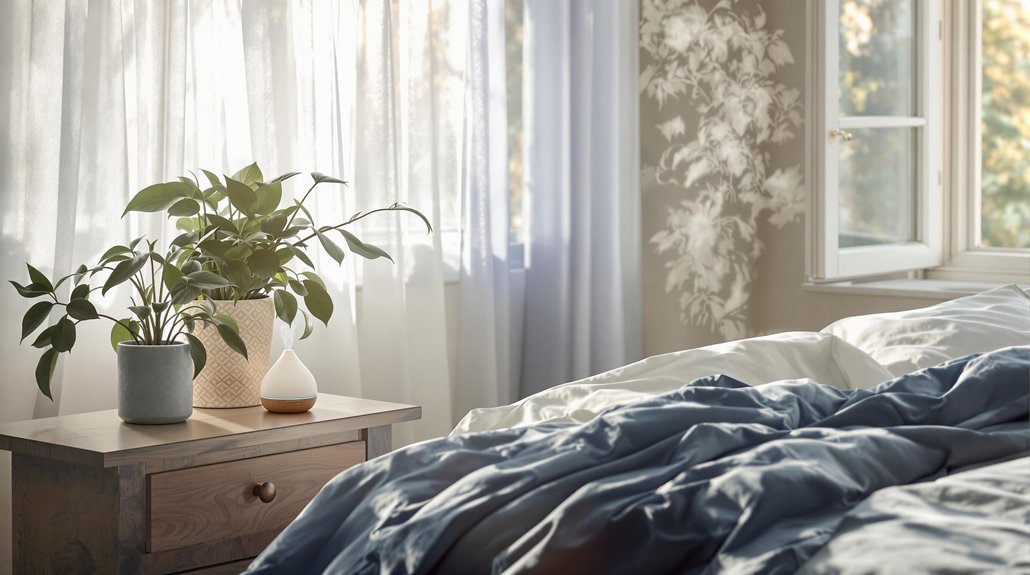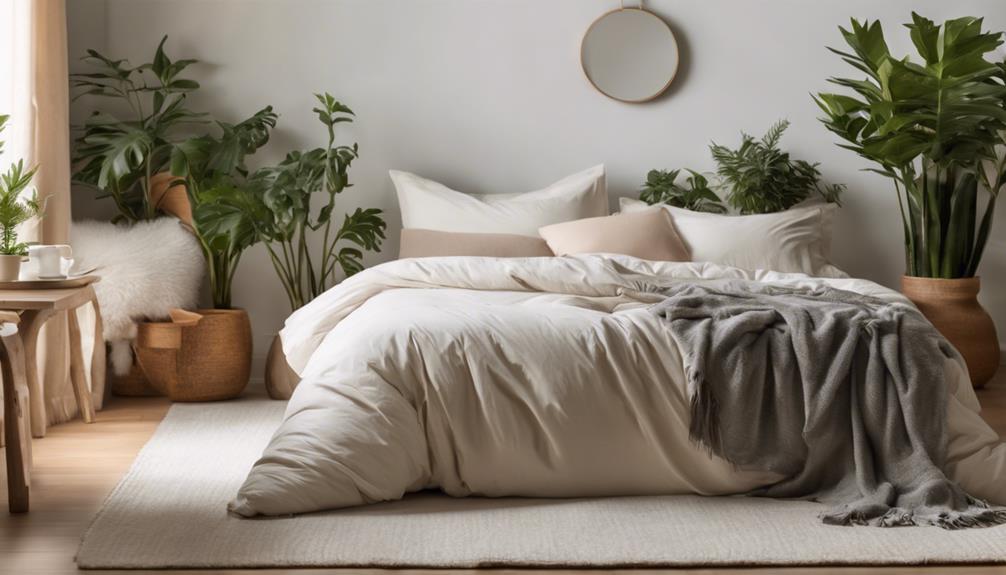
5 Tips to Get Rid of Sleep Smell in Your Bedroom
Eliminate sleep odours in your bedroom by targeting key environmental factors. First, improve ventilation by opening windows and using air purifiers with high Clean Air Delivery Rates (CADR). Regularly clean bedding at high temperatures to prevent odours and allergens. Employ air purifiers with activated carbon filters for efficient deodorising. Thoroughly remove dust with microfibre cloths and vacuum cleaners equipped with HEPA filters to capture fine particles. Finally, integrate pleasant scents through essential oils and natural fragrances, ensuring fresh air circulation for ideal results. By addressing these areas, you can create a more inviting bedroom environment and explore additional techniques.
Key Takeaways
- Open windows daily for at least 10 minutes to improve air circulation.
- Wash bed sheets and pillowcases weekly in hot water to remove odours.
- Use an air purifier with carbon filters to effectively deodorise the room.
- Dust surfaces and hoover carpets regularly to eliminate odour-causing particles.
- Use essential oils or scented candles to add a pleasant aroma to the room.
Improve Ventilation
Have you ever considered the key role ventilation plays in maintaining a fresh and odour-free bedroom environment? Adequate ventilation is necessary in promoting fresh air circulation, which greatly mitigates musty smells and stale odours. Regularly opening windows for at least 10 minutes daily is a practical approach to guaranteeing ideal air exchange and circulation in your bedroom. This practice aids in dispersing accumulated pollutants and moisture, thereby enhancing air quality. To further improve air quality, integrating air purifiers with a high Clean Air Delivery Rate (CADR) can be advantageous. These devices effectively filter out airborne pollutants and allergens, contributing to a healthier and fresher bedroom environment. Additionally, utilising a dehumidifier plays an important role in managing moisture levels, which in turn prevents the growth of mould and mildew, common culprits of unpleasant odours. A properly selected dehumidifier can ensure humidity control within the recommended range of 30-50% RH, enhancing the comfort and air quality of your bedroom. Strategically arranging furniture to avoid obstructing windows and vents is essential to maintaining unimpeded airflow. This guarantees that ventilation paths remain clear, enhancing air circulation throughout the room. In addition, incorporating exhaust fans, especially in adjoining bathroom areas, can facilitate the removal of stale air, further preventing odours from permeating the bedroom.
Clean Bedding Regularly
Guaranteeing regular cleanliness of bedding is imperative for maintaining a hygienic and odour-free sleeping environment. To effectively eliminate accumulated odours, sweat, and bacteria, it is recommended to wash bed sheets and pillowcases at least once a week using hot water at temperatures of 60°C or higher. This practice not only maintains clean bedding but also serves as a preventive measure against potential health concerns associated with allergens and bacteria. Furthermore, duvets and comforters should be aired out monthly to prevent the onset of musty smells, maintaining their freshness. Regular cleaning every few months is advised to guarantee that these items remain free of odours. Additionally, pillows, known for harbouring allergens and odours, should be thoroughly cleaned at least twice a year. A mattress protector serves as an essential barrier, shielding the mattress from moisture and bacterial accumulation, and thereby minimising unpleasant odours. Airing out bedding in sunlight, when feasible, leverages UV rays' natural properties to kill bacteria and further reduce odours. Utilising bins and baskets for quick clutter control can help keep your bedroom organised and maintain a fresh environment.
Use an Air Purifier
Maintaining a fresh sleeping environment involves not only clean bedding but also addressing the quality of air within the bedroom. An air purifier is instrumental in removing unpleasant odours and keeping your bedroom smelling clean, which is essential for a good night's sleep.
Particularly, air purifiers equipped with carbon filters are adept at deodorising, effectively tackling smells caused by poor ventilation and other airborne pollutants.
When selecting an air purifier, the Clean Air Delivery Rate (CADR) is a significant specification. It quantifies the device's efficiency in filtering airborne contaminants, ensuring ideal performance in removing unpleasant odours.
Equally important is choosing an air purifier that matches your bedroom's size, as this enhances its capability to eliminate odours and improve air quality.
Regular maintenance, such as timely filter replacements, is essential to sustain the air purifier's efficiency and prevent odour accumulation.
Additionally, air purifiers are effective at reducing allergens such as pet dander and dust mites. These allergens can contribute to unpleasant smells and adversely affect sleep quality.
Consequently, employing an air purifier not only helps get rid of odours but also enhances the overall air quality, contributing to a healthier sleep environment.
Remove Dust Thoroughly
Despite its seemingly innocuous presence, dust accumulation in the bedroom can markedly contribute to unpleasant odours and deteriorated air quality. Effective dust management is vital to help keep bedroom smells at bay and guarantee your bedroom remains a sanctuary for a good night's rest.
To remove dust thoroughly, a strategic approach is necessary.
- Employ a microfibre cloth to dust surfaces at least once a week, capturing dust particles effectively and preventing them from contributing to unpleasant smells.
- Regular vacuuming of carpets, rugs, and upholstery is essential, as these areas tend to accumulate dirt, trapping dust that can emit stale odours over time.
- Pay attention to often-neglected areas like under the bed, on blinds, and ceiling fans. Dust buildup here can greatly affect air quality and should not be overlooked.
- Utilise a vacuum cleaner equipped with a HEPA filter. This advanced filtration system can trap fine dust particles and allergens, thereby enhancing the overall air quality in your bedroom.
- Consider using a dehumidifier for bedrooms to improve air quality by reducing humidity and preventing mould growth, which can also contribute to unpleasant odours.
Add Pleasant Scents
Elevating the olfactory experience of a bedroom can greatly enhance its overall ambience, promoting both relaxation and restfulness. Implementing pleasant scents is an effective strategy to mask undesirable odours, such as those emanating from dirty laundry. Essential oils, such as lavender, chamomile, and vanilla, are particularly efficacious in creating a serene environment.
Utilising essential oil diffusers can disperse these calming fragrances throughout the air, facilitating a soothing atmosphere conducive to restful sleep. Reed diffusers also serve as an excellent medium for consistent scent diffusion, providing a steady release of aroma without requiring electricity.
In addition, scented candles, such as those from Jo Malone, offer dual benefits: they not only emit delightful smells but also enhance the visual aesthetics of the space through their decorative jars. Opening windows and doors periodically can further assist in circulating fresh air, thereby augmenting the effectiveness of odour eliminators like Air Wick® Essential Oils Infusion, which specifically targets and neutralises lingering odours.
For a more subtle infusion of fragrance, incorporating potpourri or fresh flowers can augment the room's ambience without overwhelming the senses. Introducing natural elements like rattan decor can enhance the aesthetic appeal while maintaining the tranquillity of the space. These natural elements contribute to an inviting atmosphere, helping to make the bedroom a haven of tranquillity.
Frequently Asked Questions
How to Get Rid of Sleep Smell in Bedroom?
To effectively eliminate sleep odours, prioritise bedding cleanliness and mattress maintenance, regulate humidity and air circulation, and employ essential oils or scent diffusers. Implement regular vacuuming, optimal laundry frequency, and maintain ideal room temperature to enhance sleep hygiene.
Why Does My Room Smell Bad After I Sleep?
Bedroom odours after sleep can result from inadequate air circulation, poor mattress care, and lack of pillow freshness. Enhancing sleep hygiene, controlling humidity, regular fabric cleaning, and maintaining personal hygiene are essential. Consider scent preferences and consistent nightly routines.
How Do I Permanently Get Rid of a Smell in My Room?
To permanently eliminate odours, implement regular cleaning routines, enhance ventilation, and maintain humidity control. Employ air purifiers, odour absorbers, and fabric sprays. Integrate essential oils and scented candles while ensuring bedding refresh, mattress maintenance, and consistent ventilation.
How Can I Freshen the Air in My Bedroom?
To effectively freshen bedroom air, integrate air purifiers options with appropriate CADR ratings, essential oils via aroma diffusers, and natural deodorisers. Employ ventilation methods, utilise indoor plants, apply fabric sprays, scented candles, and maintain rigorous cleaning routines and humidity control.
Conclusion
To summarise, addressing the issue of sleep odour in the bedroom involves a multifaceted approach that incorporates improved ventilation, regular cleaning of bedding, utilisation of air purifiers, thorough dust removal, and the addition of pleasant scents. These strategies, supported by evidence in environmental health studies, work synergistically to enhance indoor air quality and promote a more pleasant olfactory environment. Implementing these measures systematically can greatly reduce persistent odours, contributing to a healthier and more invigorating sleeping area.



Leave a Reply